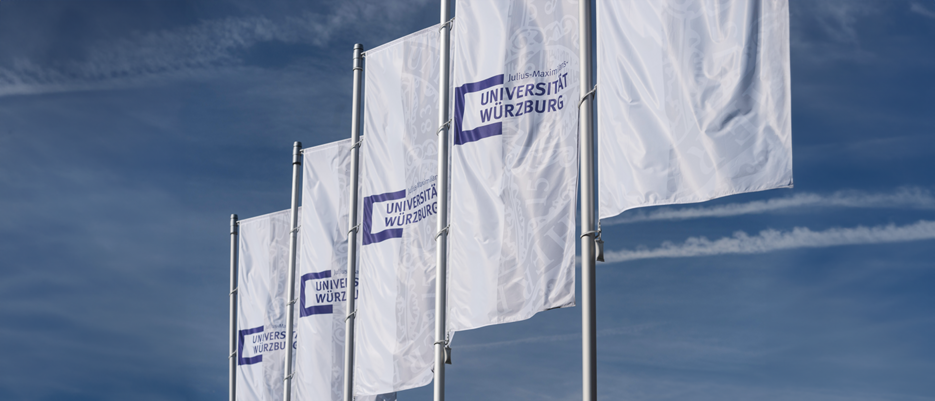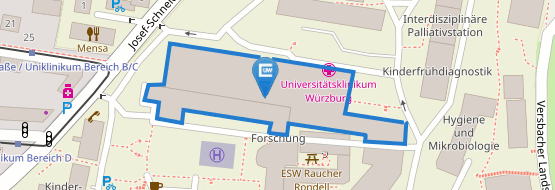Excellence Strategy: University of Würzburg Reaches Final Round
08/22/2024The competition for the multi-million euro federal and state funding programme is entering its final phase. JMU has submitted two proposals and the results of the evaluation will be available in May 2025.

The University of Würzburg (JMU) has submitted two full proposals for the final round of the competition for funding under the Excellence Strategy – together with TU Dresden, a renewal proposal for a project in quantum physics that is already being funded, and, together with the Munich universities TUM and LMU, a new proposal for nucleic acid research. JMU hopes to secure the coveted multi-million euro funding for both projects for the next funding period of the Excellence Strategy, which will start in 2026.
“The submission of our full proposals is an important milestone for our university”, says University President Paul Pauli. He is convinced: “We have the expertise and scientific excellence to successfully pass this final, crucial hurdle in the review process. Both research projects show that Würzburg is a location for excellent science and plays in the international 'Champions League'.”
The physics project ct.qmat was successful in the first round of the Excellence Strategy and has been be funded from 2019. As an existing cluster, the researchers are automatically entitled to submit a full proposal. The cluster is now reapplying under the extended name “ctd.qmat”. The NUCLEATE draft proposal is a new application that has been selected for the next, final round by an international panel of experts on the basis of a draft proposal submitted in February together with its Munich partners (we reported).
From October to mid-February 2025, another panel of experts will evaluate and review the full proposals thoroughly. The final decision on which projects will be funded will be taken at the end of May 2025.
Cluster of Excellence ctd.qmat – Complexity, Topology and Dynamics in Quantum Matter
The Würzburg-Dresden Cluster of Excellence is entering the competition for the second funding period under the name “ctd.qmat – Complexity, Topology and Dynamics in Quantum Matter”. Since 2019, this cluster (the only one to date to span two federal states) has been connecting two leading research environments in condensed matter science – the Universities of Würzburg and Dresden. It unites over 300 researchers from more than 30 countries, working on fascinating topological quantum materials that will drive future high-tech innovations. The cluster is now expanding its research focus to include the new dimension of quantum dynamics, an increasingly important branch of solid-state physics.
“With over 1,300 publications and six patents, we have surpassed our goals for the first funding period”, says Professor Ralph Claessen, the Würzburg cluster spokesperson and Chair of Experimental Physics IV at JMU. He adds that ctd.qmat’s volume of applied research output is exceptional for fundamental research: “The patents we’ve developed, including those for topological lasers and ultra-precise measurement, lay the groundwork for practical technological applications. Our strategy has paid off!” In the second funding period, ctd.qmat plans to establish six new professorships, including three in Würzburg, to complement the existing six cluster professorships.
About the Research Project „NUCLEATE - Cluster for Nucleic Acid Sciences and Technologies“
NUCLEATE is dedicated to the revolutionary field of nucleic acid research and technologies. The mission of the research network is to harness the potential of nucleic acids towards a new understanding of their role in biology and to pave the way into the field of nucleic acid medicine. NUCLEATE thus pursues a nucleic acid-centred approach with a highly interdisciplinary team.
“As part of NUCLEATE, we are exploring fundamental biological principles and mechanisms of action of nucleic acids in the cell in diverse disease contexts“, explains Würzburg NUCLEATE spokesperson Professor Cynthia Sharma, Chair of Molecular Infection Biology II. “We aim to use these insights to develop new nucleic acid-based biotechnological and biomedical applications.“
“Working together across disciplines at three Bavarian universities and combining our expertise in the field of nucleic acids, strengthens biomedical research in Bavaria in the long term - both nationally and internationally,” emphasises Professor Caroline Kisker, who is coordinating the research project on the Würzburg side together with Professor Sharma and is also a Vice-President of JMU and Chair of Structural Biology. “We are thus paving the way for nucleic acid-based technologies and medicine.” NUCLEATE is a joint Cluster proposal that JMU has submitted together with Ludwig-Maximilians-Universität Munich (LMU) and the Technical University of Munich (TUM).
What is the Excellence Strategy?
The Excellence Strategy is a programme by the German federal and state governments to promote the international competitiveness of German universities. Currently, 57 Clusters of Excellence are being funded within this programme with an annual funding amount of 385 million euros. In the second funding period, which will begin in 2026, up to 70 Clusters of Excellence can be funded. An annual sum of 539 million euros is available for this purpose.
The deadline for new draft proposals was 31 May 2023. A total of 143 drafts from 59 universities were submitted to the German Research Foundation (DFG). A panel of international experts reviewed these and, in February 2024 , selected 41 of them to proceed to the full proposal stage – including JMU’s NUCLEATE.
On the Way to Becoming a University of Excellence
A second funding line within the Excellence Strategy is the “Universities of Excellence”. Universities can apply for this funding line if they have secured funding for at least two Clusters of Excellence – regardless of whether they are running these clusters alone or in alliance with other universities. For JMU President Pauli, the submission of the two full proposals is an important milestone on Würzburg's path to becoming a University of Excellence: “Even though the final decision on the full proposals for the clusters will not be made until the spring of 2025, we have already started preparing our application for University of Excellence status. Apart from the Munich universities, the University of Würzburg is currently the only university in Bavaria that still has a chance of winning the coveted title of University of Excellence.“
Further information on the Excellence Strategy can be found on the JMU website.


